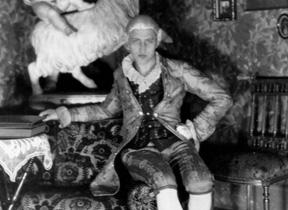I am Von Höfler (Variation on Werther)
Von Höfler vagyok—Werther variáció HUNGARY / 2008 / English, Hungarian / Color, B&W / Video / 160 min
HUNGARY / 2008 / English, Hungarian / Color, B&W / Video / 160 min
Director, Script, Photography, Producer: Forgács Péter
Home movies and photographs: Höfler Tibor
Narrator: Forgács Péter, Bodóczky Caroline, Bodóczky Miklós, Majláth George, Pogson Jane, Szász Liz, Szász Eszter
Music: Szemző Tibor, Melis László
Editor: Sass Péter
Sound: Vadon Zoltán, Zányi Tamás
Production Company, World Sales: For-Creation Bt. 2008
The 250-year story of the Hungarian Von Höfler family, depicted through the monologue of an elderly man, photographs, home movies, and letters, as well as a film adaptation of The Sorrows of Young Werther, said to be based on one of the family’s ancestors. Emerging from these personal recollections and archives is not only the history of one family, but also the trajectory of the country called Hungary, tossed by the waves of history.
[Director’s Statement] “Everything we see, could be otherwise. Everything we can describe at all could also be otherwise . . .” Ludwig Wittgenstein, The Tractatus
Could the obscenity of history be erased by uchronia? (If utopia is the utopist’s terrain, uchronia is the utopist’s time sphere). My work is (virtually nothing other than) a question to memory. In other words, I create fading factual fiction, meta-dream, meta-reality. A reading of private history. Since cinematography radically changed our view by constant, instant replay, re-use, and recycling, the anecdotic time base of human perception vanished.
By the flood of permanent representation through various manipulations re-creating the past, the uchronial perception is right here. Are there other ways to be in dialogue with the past? Maybe that’s one of the reasons why I’ve chosen to create a different patchwork of time—to try to answer the riddles of “facts.” The immortalizing private film is a kind of “narrative image dialect,” similar to everyday language—accented by a Freudian slip, a collection of mistakes. Selected pictures from the stream of the(ir) local time builds a private film. The spectator re-constructs a vision by the occasionally grasped film fragments. We may see time as it “happened” then and there. The mortal actors of private histories are like ephemeral monuments of their own life. They (we) strive for eternity, the “beautiful,” the “funny,” or the “interesting.” Again recalling Wittgenstein, these values are permanently changed by language games of meanings: what was “beautiful” yesterday can be disgusting tomorrow, or even comic and sentimental today. Life on celluloid becomes the order of things. The film memory (the collection of accidental things and facts) suggests that life could have happened “only that, and no other way.” Time freezes in the trap of ephemeral feelings. The picture flashes and the archaic image appears. That is what I am looking for, behind the curtain.
 Forgács Péter
Forgács Péter
Born in 1950,he began his studies at the Hungarian Academy of Art in 1971 but was dismissed from the course in the same year. Started to exhibit photographs, graphics, and performance in the Budapest underground art scene in 1976. As an independent filmmaker Forgács worked—from 1978—at the Béla Balázs Film Studio, Budapest; meanwhile, as a recitativo (1978–1986) he worked in the contemporary music ensemble Group 180 (180-as Csoport). Since the early 1990s his video installations have been presented at museums and art galleries throughout Europe and the US. Forgács has created more than thirty videos and films, the best-known of which is the prize-winning series “Private Hungary.” He often re-uses amateur films from the 1920s to the 1980s in his films. Forgács first gained international recognition with The Bartos Family in 1988 at the World Wide Video Festival (The Hague). Angelos’Film screened at YIDFF 2001. In 2007 he was awarded the Erasmus Prize by the Dutch Praemium Erasmianum Foundation. |
